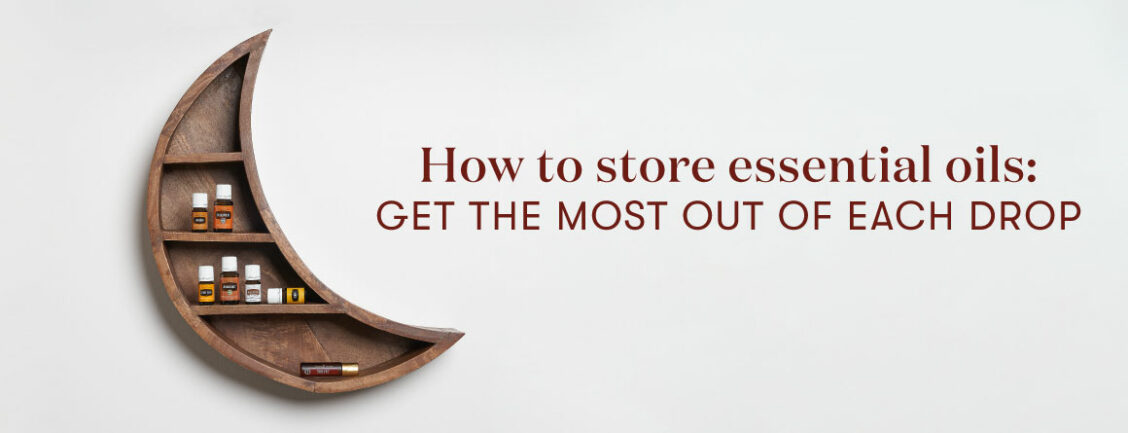
Essential oils are an investment in your health and well-being. Learning the dos and don’ts of storing them is just one important way to protect your wellness investment and maximize their benefits.
How to properly store essential oils
Whether you’ve just jumped into essential oils or have a longtime collection you’ve been meaning to organize, these tips for properly storing your favorite products will keep your house happy and your health prioritized!
Keep the bottle lids on tight
A tight lid prevents oxidation, air, or water from getting inside the bottle.
- Less contact with air allows the oil to retain its properties. Frequent and prolonged exposure to air can alter the consistency, smell, and properties of the oil.
- Closing lids tightly also stops oil from evaporating.
YL tip: The plastic fitment on the bottle allows the oil to escape one drop at a time and also helps keep air and water out. Be sure to leave it on the bottle!

Photo by Ashley Griffin
Avoid heat and direct sunlight
- Too much heat or sunlight can impact the quality of the oil.
- Both heat and sunlight can change the chemical composition of the oil.
- Too much heat can cause the oil to evaporate more quickly, making it less effective.
- Too much sun can deteriorate the oil.
YL tip: Keep essential oils in a closet or drawer and avoid leaving them in your car. A good rule of thumb is to keep oils in a cool, dark place.
How to store essential oils for traveling
If you’re anything like us, you keep your favorite oils on hand wherever you go—your gym bag, your desk, and your purse. You can preserve your oils and store them safely while on the go by using a carrying case made especially for essential oils. Take the 30 essential oils carrying case with you wherever you go!
How to display essential oils
You love your oils and you’re not afraid to show it! Display them in your home with a stylish shelving unit along with a potted plant or chic decor. Be sure to keep them away from sunlight and enjoy an eye-pleasing display of your fave always-on-hand oils!
Need a little inspiration on how to display and organize your oils? Check out the photo submissions from Young Living members throughout this post!

Photo by Mackenzie Waldron
Get your questions answered
Have questions about storing your oils, keeping the quality consistent over time, and getting the most out of each little bottle? Here are some frequently asked questions:
1. Can you keep essential oils in the fridge?
Some essential oil lovers swear by putting their oils in the fridge. It isn’t so much the lower temperature that matters—oils do not need to be kept that cold—but the consistent climate. Your fridge stays the same temperature day and night, which helps preserve the oil. If you don’t want your oil to be cold when you use it, be sure to remove it about 1–2 hours before you’ll need it so the oil can return to room temperature. Once you’re finished using the oil, put it back in the fridge so it can return to a consistent temperature.
2. Is it okay to freeze essential oils?
Putting essential oils in the freezer is perfectly safe. The consistent temperature and lack of light will help to preserve your oils. There are some oils—like Rose, Thyme, and others—that may have natural components that solidify or crystallize in the freezer. If your oils do this, simply allow them to thaw before you use them by keeping them at room temperature. Once you’re finished with them, return them to your freezer to store.

Photo by Frankie Gene
3. Can essential oils be stored in plastic bottles?
Essential oils are incredibly powerful, which means that many oils will dissolve plastic. For this reason, it’s recommended to keep oils in glass bottles or stainless-steel containers. Keep this in mind when you make essential oil-based DIYs like DIY body spray or facial toner.
4. Do essential oils need dark bottles?
You’ll notice that all Young Living essential oils come in amber bottles. That’s to protect them from light, which can alter their delicate composition. We recommend always storing your essential oils in dark or opaque bottles to preserve their quality.
5. Do essential oils expire?
Essential oils don’t expire in the traditional sense. When stored properly, essential oils can last for years. But because of a process called oxidation, which begins the moment you open your bottle and expose the oil to the air, oils will gradually change over time. Following the suggestions mentioned above—storing oils in dark bottles, keeping them out of the sun, and storing them at room or cool temperatures—will help prolong the lifespan of your oils.

Photo by Rachel Lynn Engen
Looking for more sparks of inspiration for how you can use your oils? Check out essential oils for travel (and other vacay must-haves) or how to create your own essential oil diffuser blends.
What’s your favorite way to store your essential oil collection?
Tell us in the comments!
The post How to store essential oils: Get the most out of each drop appeared first on Young Living Blog.

